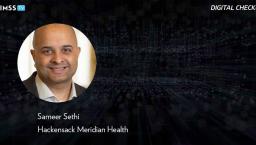UConn Health squares away CMS audit trail and more with digital health platform

Photo: UConn Health
Musculoskeletal care is a critical service line in healthcare. More than 50% of the adult population in the U.S. has some form of MSK condition, and the impact on people’s lives is significant.
THE PROBLEM
Pain and mobility issues affect day-to-day living and independence. Quality of life changes dramatically with the compounding effects on mental health; comorbidities like cardiovascular disease, diabetes or obesity; the ability to work; and financial security.
It’s clear why these conditions are so costly – both in terms of the impact on people’s lives and the cost to the U.S. healthcare system. UConn Health sought to further enhance orthopedic care access and health equity for Connecticut citizens, particularly those in rural and underserved communities.
"In addition, we were seeking a solution to facilitate standardizing our evidence-based care pathways across our health system, while incorporating flexible, virtual options for our patients for education, physical therapy, care team communication and more," said Dr. Isaac L. Moss, chair of the department of orthopedic surgery, co-director of the comprehensive spine center, and program director of the UConn Spine Surgery Fellowship, at UConn Health.
"Particularly for patients in rural areas, the digital care management approach is a proven conduit for improving access," he continued. "For example, it eliminates the time, expense and stress patients experience traveling to attend their pre-surgery class and in-person follow-up visits for joint replacement surgery."
And no matter where patients are located, they should have access to the same high-quality, evidence-based care to help them achieve the best possible outcomes, he added. This project has become even more important in the wake of the COVID-19 pandemic, as many patients are seeking virtual options to supplement their in-person care, he said.
PROPOSAL
Moss said the digital care management platform proposed by Force Therapeutics has been proven successful in engaging patients in care prescribed by their own providers using interactive educational content, customized goal setting and direct messaging tools to support patient adherence to post-surgery recoveries or nonsurgical care pathways.
"The platform overcomes common access barriers as well, such as internet access, language, learning styles, travel and schedules to improve patient outcomes and satisfaction while increasing efficiency and reducing costs," he said.
"The platform overcomes common access barriers as well, such as internet access, language, learning styles, travel and schedules to improve patient outcomes and satisfaction while increasing efficiency and reducing costs."
Dr. Isaac L. Moss, UConn Health
"The platform further enhances care by enabling our care teams to standardize patient education and care pathways for each condition and consistently collect patient-reported outcomes and other data across our spine, joint and sports medicine service lines," he noted.
"While care is standardized, the care pathway for each patient can be easily adapted by the care team to meet individual needs. Patient interactions with the platform reliably monitor progress and capture key metrics, such as PROs, medication adherence, pain, response to therapy, physical activity and more."
MEETING THE CHALLENGE
UConn Health went live on the platform in early August 2023, and it is in active use by patients and more than 60 MSK surgeons, care team members and clinical practice leaders for spine, arthroplasty, sports and foot/ankle care.
Direct integration with UConn Health’s Epic electronic health record system creates a seamless process from surgery scheduling through preoperative care and postoperative recovery at home.
"Standardized, digitized care management gives our care teams a holistic view of patients and their entire care episodes," Moss said. "Providers can individualize diagnosis, surgery and follow-up care information based on each patient’s needs, comorbidities and support structures at home.
"When patients engage with the platform, instead of disjointed, paper-based patient education, they have access to educational content that caters to different learning styles," he explained. "They set their own care goals. For example, patients have set goals to be able to play with their grandkids or ride their mountain bikes again. Gamification helps patients absorb important information and stay committed toward achieving the best possible outcomes.
UConn Health care teams actively monitor PROs to evaluate utilization, pain, function, clinical benefit, mental health, wellbeing and patient experience. Care teams are alerted immediately and can intervene quickly when a patient is concerned or isn’t progressing as expected.
Such early intervention prevents potential complications from escalating and avoids unnecessary ED visits and readmissions, while helping patients feel reassured and confident in the care they receive, Moss said.
"Delivering care at home improves access to care across our communities and helps patients manage their conditions or recover from surgery without the added costs of in-person care," he continued. "In addition, we are finding some patients require very little personal assistance, which frees up time for our care teams to focus on those who need more help.
"Throughout the process, the digital care management approach captures holistic, contextual data, creating a more meaningful, measurable and even predictive view for better patient care and outcomes," he added.
Another aspect of this approach is reimbursement. In 2022, the Centers for Medicare & Medicaid Services introduced new CPT codes for remote care delivered via a digital care management platform that qualifies with the Federal Drug Administration as software as a medical device (SaMD).
"Our platform fulfills the requirements for patient engagement and data capture; for example, patients need to submit PROs for 16 days out of each 30-day period, and we need to have a measurable, defensible audit trail for reimbursable activity," Moss explained.
RESULTS
Though the go-live was very recent, UConn Health is highly encouraged by the results thus far.
For the approximately 200 patients who have engaged with the platform to date, the data shows 87% are compliant with PROs – reporting on pain, activity, filling out HOOS or KOOS forms, etc.
"Other key performance indicators, such as length of stay, readmissions and patient safety, will give UConn Health insight into macro trends at the procedural, clinician, facility and population levels for ongoing quality improvement," Moss said. "We will follow these trends as more data is gathered over time.
"The wealth of data we are collecting also will prepare UConn Health to meet increasingly rigorous CMS reporting requirements," he continued. "For example, the Hospital Inpatient Quality Reporting (IQR) program will make it mandatory for hospitals to collect and report PROs, risk variables, matching variables and PROs-related variables for at least one-half of eligible total hip and total knee patients."
ADVICE FOR OTHERS
"Digital care management technology has been proven effective for improving patient engagement, satisfaction, care quality and outcomes, as well as reducing costs for both patients and providers," Moss noted. "In addition, these technologies meet the patients where they are (both literally and figuratively), removing many of the barriers to high-quality care patients face across the country.
"As organizations evaluate these technologies, it’s important to involve both leadership and hands-on care teams for the key MSK service lines in all aspects of the process," he concluded. "Through this level of collaboration, organizations gain buy-in and adoption, while ensuring they standardize on the best evidence-based care plans for their patient populations."
Follow Bill's HIT coverage on LinkedIn: Bill Siwicki
Email him: bsiwicki@himss.org
Healthcare IT News is a HIMSS Media publication.

























